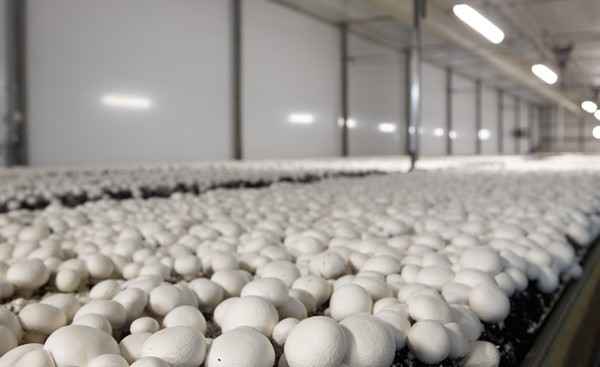Prices on the European mushroom market have improved recently. "That was needed, too," begins Paul Delbeke of the Belgian company VOC-Districhamp. "and will have to continue for some time. Before costs can be passed on, in many cases, people work at a loss for some time. To compensate, we need these good prices to last a good while."
Market pressure has, however, subsided somewhat after a very tough period. "Belts are being loosened slightly. Demand is high, partly due to shortages of other vegetables. There, prices are shooting to unprecedented heights, with triple of four times no longer an exception. Ultimately, of course, that's not healthy either. There's a line consumers won't cross when buying products. That benefits mushroom consumption. It's then a cheaper alternative," says Paul.

He is not currently experiencing much overseas competition. "Poland is our biggest competitor. There are plenty of growers there, but because of the crisis, many seem to have stopped temporarily or completely. I think it's temporary, so we expect them back on the market, but at present, there's a lot of room for Belgian supply."
Growers always playing catch-up
Yet, on the supply side, costs remain as high as ever for growers and brokers. "Energy prices may have normalized again, but that doesn't outweigh other increases we're experiencing. For us, that's mainly compost, but things like packaging, wages, and transportation are also still costly," admits Paul.
"Neither do I see that declining any time soon. Fortunately, demand will continue for a while, I think. But we're always mindful of what could happen. All it takes is a new Putin to arise, and the world's upside down again with consequences that cannot be gauged."
"Growers and middlemen are always playing catch-up anyway. Firstly, there are cost increases, and then you can only slowly adjust selling prices to new increases. For example, we receive our electricity and gas bill six weeks later. Only then can we renegotiate prices with customers. In the meantime, we incur costs we can't offset," Delbeke says.
VOC-Districhamp does not sell under the organic banner. Despite that, they use no cultivation agents thanks to a pull-through system. "That splits the cultivation, reducing disease risk. We never have to highly steam the growing cells at the end of the cycle, so we can reduce energy costs somewhat. We're also considering a second flush to add a third crop, free of disease risk and with free raw materials, thus reducing the kg cost."

Robotization and water management
Looking ahead, Paul sees the sector changing. "I think there are, undoubtedly things to come in the area of robotization. There are plenty of harvesting optimization ideas. There are already several options in packing, but there's no good harvesting alternative yet. We already use a picking belt, but it won't end there. We're moving toward automation and are definitely keeping an eye on that. For now, however, there's no adequate robot to take the work completely out of our hands," he explains.
Paul expects water to become another essential part of any future strategy. "Our sector needs vast amounts of water. In the Netherlands and Belgium, we can still deal with that, but we're already feeling pressure from the government concerning storage and reuse. Southern Europe, nonetheless, faces genuine shortages. That's evident in open-field vegetables already. There's less groundwater every year; some lakes are only half full at times when they'd normally be overflowing. One will have to adapt to the new climatic reality."
Packaging-wise, though, Paul does not see much changing any time soon. "It's tough to simply move away from plastic. We may, eventually, move to alternatives, but for now, they're too expensive. Anything other than plastic raises cost prices so much that we'd have to pass that on too, and we can't. Mushrooms must remain affordable; they're not luxury items," he concludes.
For more information: Paul Delbeke
Paul Delbeke
VOC-Districhamp
66 Brugsesteenweg
8740, Pittem, Belgium
Tel: +32 (0) 514 85 897
Email: info@voc-districhamp.be
Website: www.voc-districhamp.be
